Related Research Articles

Guglielmo Giovanni Maria Marconi, 1st Marquis of Marconi was an Italian inventor and electrical engineer, known for his creation of a practical radio wave-based wireless telegraph system. This led to Marconi being credited as the inventor of radio, and he shared the 1909 Nobel Prize in Physics with Karl Ferdinand Braun "in recognition of their contributions to the development of wireless telegraphy".

Walter Hubert Annenberg was an American businessman, investor, philanthropist, and diplomat. Annenberg owned and operated Triangle Publications, which included ownership of The Philadelphia Inquirer, TV Guide, the Daily Racing Form and Seventeen magazine. He was appointed by President Richard Nixon as United States Ambassador to the United Kingdom, where he served from 1969 to 1974.
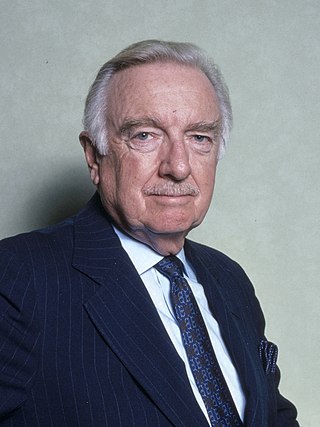
Walter Leland Cronkite Jr. was an American broadcast journalist who served as anchorman for the CBS Evening News for 19 years, from 1962 to 1981. During the 1960s and 1970s, he was often cited as "the most trusted man in America" after being so named in an opinion poll. Cronkite received numerous honors including two Peabody Awards, a George Polk Award, an Emmy Award and in 1981 was awarded the Presidential Medal of Freedom from President Jimmy Carter.

Walter Marty Schirra Jr. was an American naval aviator, test pilot, and NASA astronaut. In 1959, he became one of the original seven astronauts chosen for Project Mercury, which was the United States' first effort to put human beings into space. On October 3, 1962, he flew the six-orbit, nine-hour, Mercury-Atlas 8 mission, in a spacecraft he nicknamed Sigma 7. At the time of his mission in Sigma 7, Schirra became the fifth American and ninth human to travel into space. In the two-man Gemini program, he achieved the first space rendezvous, station-keeping his Gemini 6A spacecraft within 1 foot (30 cm) of the sister Gemini 7 spacecraft in December 1965. In October 1968, he commanded Apollo 7, an 11-day low Earth orbit shakedown test of the three-man Apollo Command/Service Module and the first crewed launch for the Apollo program.
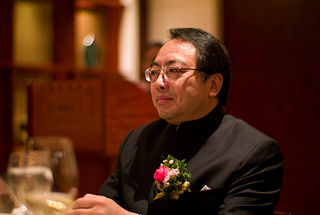
Lap-Chee Tsui is a Chinese-born Canadian geneticist and served as the 14th Vice-Chancellor and President of the University of Hong Kong.
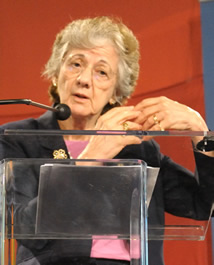
Rita Rossi Colwell is an American environmental microbiologist and scientific administrator. Colwell holds degrees in bacteriology, genetics, and oceanography and studies infectious diseases. Colwell is the founder and Chair of CosmosID, a bioinformatics company. From 1998 to 2004, she was the 11th Director and 1st female Director of the National Science Foundation.

Sylvia Alice Earle is an American marine biologist, oceanographer, explorer, author, and lecturer. She has been a National Geographic explorer-in-residence since 1998. Earle was the first female chief scientist of the U.S. National Oceanic and Atmospheric Administration, and was named by Time Magazine as its first Hero for the Planet in 1998.

Allen Harold "Al" Neuharth was an American businessman, author, and columnist born in Eureka, South Dakota. He was the founder of USA Today, The Freedom Forum, and its Newseum.

Cassie DawinCampbell-Pascall is a former Canadian ice hockey player and a current broadcaster for Sportsnet and ESPN. Born in Richmond Hill, Ontario, Campbell grew up in Brampton, Ontario, playing for the Brampton Canadettes. She was the captain of the Canadian women's ice hockey team during the 2002 Winter Olympics and led the team to a gold medal. The left winger took on the role of captain again in the 2006 Winter Olympics in Turin, Italy, and again successfully led her team to a gold medal with a 4 – 1 win over Sweden.
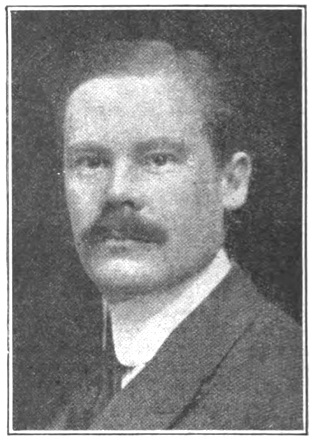
Ernst Frederick Werner Alexanderson was a Swedish-American electrical engineer, who was a pioneer in radio and television development. He invented the Alexanderson alternator, an early radio transmitter used between 1906 and the 1930s for longwave long distance radio transmission. Alexanderson also created the amplidyne, a direct current amplifier used during the Second World War for controlling anti-aircraft guns.
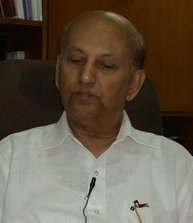
Udupi Ramachandra Rao was an Indian space scientist and former chairman of the Indian Space Research Organisation. He was also the Chairman of the Governing Council of the Physical Research Laboratory at Ahmedabad and Nehru Planetarium at Bengaluru and chancellor of the Indian Institute for Space Science and Technology (IIST) at Thiruvananthapuram. He is known as "The Satellite Man of India". He pioneered India's first satellite launch Aryabhata in 1975.
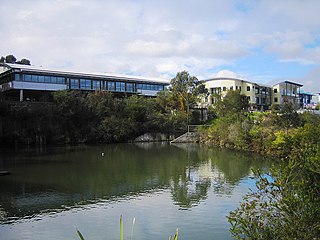
Belrose is a suburb of Sydney in the state of New South Wales, Australia 19 kilometres north-east of the Sydney central business district in the local government area of Northern Beaches Council. Belrose is also considered to be part of the Forest District, colloquially known as The Forest.
Ronald Brian Jacks was a Canadian Olympic and international swimmer in the 1960s and 1970s. He is currently a leading coach for Canadian swimmers such as Richard Weinberger through the Pacific Coast Swimming Club.
Dale Walters is a retired Canadian boxer and former child actor. During his boxing career, he won a bantamweight bronze medal at the 1984 Summer Olympics.

Richard William Duncan Pound, better known as Dick Pound, is a Canadian swimming champion, lawyer, and spokesman for ethics in sport. He was the first president of the World Anti-Doping Agency and vice-president of the International Olympic Committee. He is currently the longest-serving member of the IOC.
Derrick Martin Hall is an American sports executive currently serving as the President and Chief Executive Officer (CEO) of the Arizona Diamondbacks.
Reese Erlich was an American author and freelance journalist who wrote for CBS Radio, Australian Broadcasting Corp., and National Public Radio. He also contributed to Foreign Policy and VICE News. He wrote the nationally distributed Foreign Correspondent column. Erlich won numerous journalism awards including a Peabody.
John Matheson was a Canadian sports journalist known for his wide coverage of sports for the Winnipeg Tribune from 1946 to 1980.
Edwin King Stodola was an American radio engineer.
References
- ↑ "Jack Belrose appointed to Canadian Amateur Radio Hall of Fame". Communications Research Centre Canada. Archived from the original on 1 January 2013. Retrieved 30 August 2012.
- ↑ "Jack Belrose and Walter Cronkite receive Armstrong Medal". Communications Research Centre Canada. 15 January 2008. Archived from the original on 1 January 2013. Retrieved 30 August 2012.